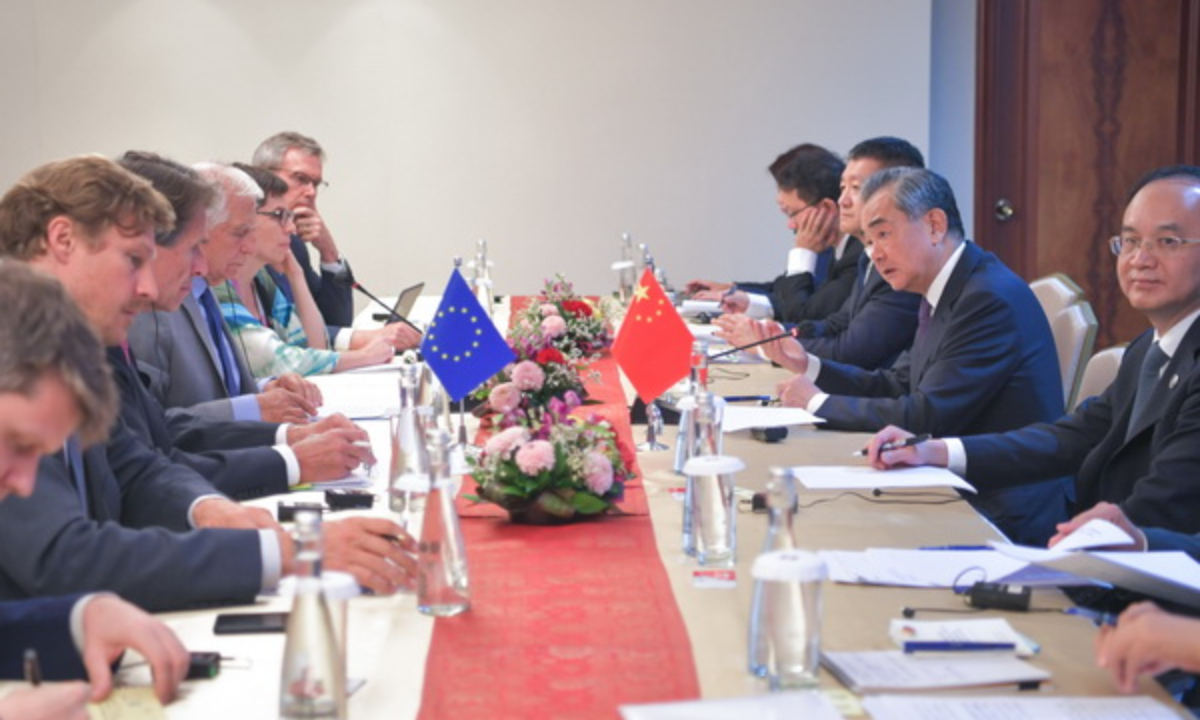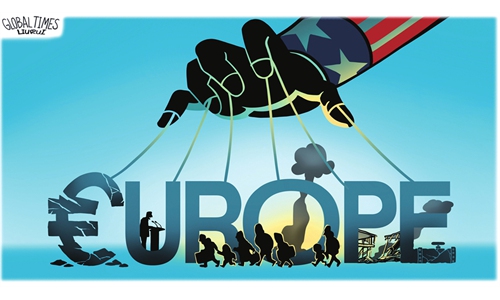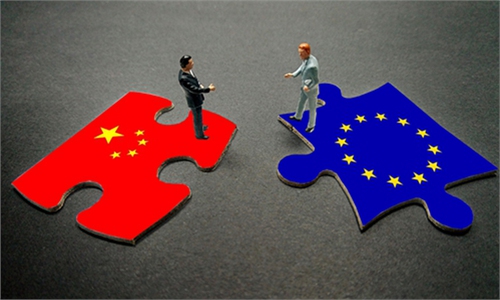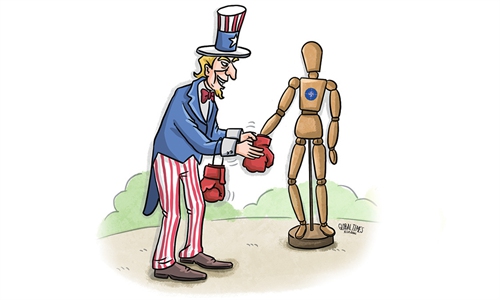‘De-risking’ doesn’t target China, says EU foreign policy chief; positive remarks reflect good momentum in China-EU ties: analysts

Photo: Ministry of Foreign Affairs
During his meeting with Wang Yi, director of the Office of the Central Commission for Foreign Affairs Friday, European Union (EU) High Representative for Foreign Affairs and Security Policy Josep Borrell said that the EU does not support confrontation of camps and parallel systems. EU's "de-risking" does not target China in any sense and the EU has no intention of hindering China's development, he said. Chinese analysts on Saturday said that such a high-ranking EU official's remarks could represent the official stance of the bloc and directly refuted negative opinions over the development of China-EU relations. Experts believed that the remarks also showed that a rather positive momentum has been built in developing China-EU ties as the result of enhanced communication and increased exchanges in recent times.
Wang Yi and Borrell met at the latter's request on the sidelines of the series of the Association of Southeast Asian Nations foreign ministers' meetings in Jarkata on local time Friday, according to the Xinhua News Agency.
During their meeting, Wang said there is no fundamental conflict of interest between China and the EU as both sides advocate multilateralism, support world multipolarity and greater democracy in international relations as well as the international system with the United Nations at its core.
Noting that this year marks the 20th anniversary of the establishment of the China-EU comprehensive strategic partnership, Wang urged the EU to further clarify its positioning of the strategic partnership between the two sides and promote China-EU relations to move forward on existing basis.
The EU should not waver, let alone encourage backpedaling on words and deeds, Wang stressed.
For his part, Borrell said that China is first and foremost an important partner of the EU, and this positioning is very clear and certain. The EU is willing to maintain a strong engagement with China and develop a constructive, stable and long-term relationship.
On the Taiwan question, Borrell said that the EU is firmly committed to the one-China policy, the core connotation of which is there is only one China in the world and Taiwan is not a country. The EU has never supported "Taiwan independence".
China plays a key role in global affairs and its global initiatives are widely welcomed. The EU is willing to explore ways to strengthen policy synergy between both sides and promote practical cooperation to achieve more results, Borrell said.
The global production and supply chain is intertwined, so it is unrealistic and impossible for Europe and China to "decouple". The EU does not support confrontation of camps and parallel systems. EU's "de-risking" doesn't target China in any sense and the EU has no intention of hindering China's development, he said.
In response, Wang stressed that China is committed to building an open economy at a higher level and will continue to share its mega market opportunities with the world. China supports the EU in pursuing strategic independence and making independent judgments, he said, adding that China is ready to work with the EU to leverage complementary advantages and dovetail each other's global initiatives, including the China-proposed Belt and Road Initiative (BRI) and EU's Global Gateway strategy.
Wang called on the two sides to guard against the politicization and instrumentalization of economic issues and the use of "de-risking" as another term for "decoupling".

Photo: Ministry of Foreign Affairs
Chinese analysts welcomed Borrell's expounding the bloc's positioning of China as an important partner, upholding one-China policy, and explaining that "de-risking" does not target China.
It is safe to say that compared with last year, there are now more positive trends in China-EU relations, showing a positive momentum on the EU part to make adjustments in its China policies, and it is a result of enhanced communication and exchanges, Cui Hongjian, director of the Department of European Studies at the China Institute of International Studies, told the Global Times on Saturday.
"De-risking" has become an unavoidable topic in bilateral ties, and it is crucial to point out that the discussion over risks should eliminate political factors and should not be single-handedly defined or controlled by the Europe. Rather, China and Europe need to work together, enhance communication in the process to figure out what the risks exactly are and how to address them together as partners, Cui noted.
Wang Yiwei, director of the Institute of International Affairs at the Renmin University of China, told the Global Times that Borrell's remarks also indicate that the Europe is different from the US, as it could accept the fact of China's rise and the EU does not seek a new cold war in the name of "decoupling."
Chinese analysts also warned that disagreements and divisions still remain among member states on whether they should stick on autonomy or become the front of camp confrontation, and that the latter option would harm the interests of both sides.
It is alerting that there are quite some pro-US forces in the Europe and the EU has no actual control over its member states or to demand them to act altogether, so that despite the EU official's positive remarks, some European countries could still follow the US' lead and practice decoupling with China in reality, Wang Yiwei said.
The two senior diplomats also exchanged views on the Ukraine issue. Wang said China supports a balanced, effective and sustainable European security architecture, and will continue to promote talks for peace and play a constructive role in seeking a political settlement of the Ukraine crisis.




